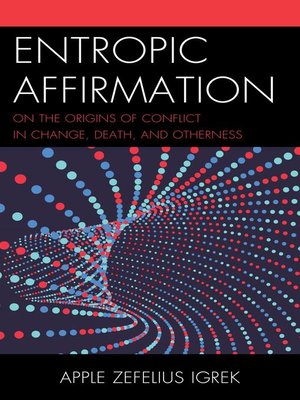Entropic Affirmation
ebook ∣ On the Origins of Conflict in Change, Death, and Otherness
By Apple Zefelius Igrek

Sign up to save your library
With an OverDrive account, you can save your favorite libraries for at-a-glance information about availability. Find out more about OverDrive accounts.
Find this title in Libby, the library reading app by OverDrive.



Search for a digital library with this title
Title found at these libraries:
| Loading... |
How do we conceptualize death when its very nature implies absence and nothingness? It is difficult to put into words precisely because we want our words to help us delineate the world around us, whereas the absence associated with death is the opposite of such delineation. For this reason, death might be said to represent a form of infinite otherness, something radically different from our usual, finite, anthropomorphic way of thinking about the world. With this in mind, Apple Igrek observes an unusual paradox. Some philosophers argue that we should be more open to that which is infinitely other (as with change or death) in the context of ethics, culture, and politics, while others critique this position since we cannot logically say what is more or less open to the immeasurable. It would therefore seem impossible to defend the relevance of what is infinite to ethics while nevertheless acknowledging the validity of the above-stated critique. If we want, in other words, to say that infinite otherness remains relevant to our social and ethical values, we will have a difficult time doing so unless we create a new methodological approach determining how it is possible for pure absence and alterity to play a role in the creation of those values. In this book Apple Igrek takes up the challenge of articulating this new approach explaining how something transcending our finite comprehension (as with death or never-ending change) is nonetheless essential for describing the construction of social values, especially in terms of describing their conflictual and agonistic tendencies.






